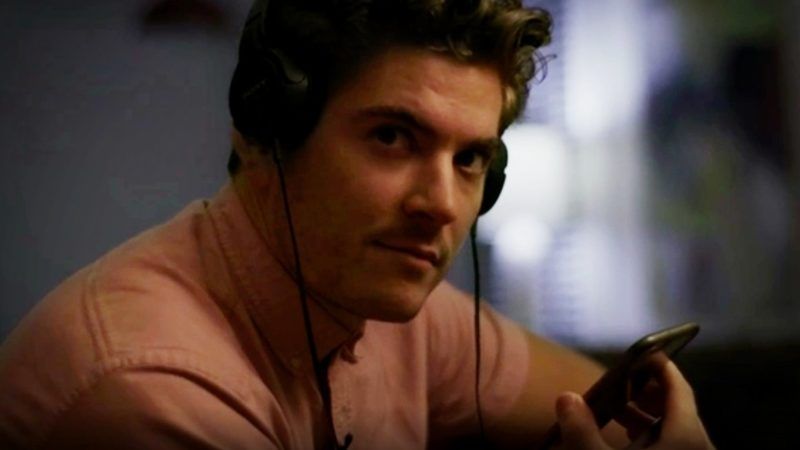A Mother's Homicide Becomes a Son's Passion Project in Murder on Middle Beach
HBO docuseries a devastating look at a family’s secret dysfunctions.

Murder on Middle Beach. HBO. Sunday, November 15, 10 p.m.
Imagine putting a microphone in the face of your father and asking, serious as death itself, "Did you murder my mother?" Now imagine doing it again, three or four or five times, with your aunts and your sister, always the same question: "Did you murder my mother?" And now you begin to get the feel of Madison Hamburg's life, and the flavor of the documentary he's spent the last eight years making, Murder on Middle Beach.
Madison, just 20 and a student at a Georgia film school when his divorcee mother was stabbed and beaten to death outside their Connecticut home in 2010, decided two years later to make a short documentary about it for a class assignment. He hoped partly to resolve his own confusion—so far from home, he knew little about what happened—and partly to prod the cops into get back to work on what was rapidly become a cold case.
In many ways, he failed abjectly. At four hour-long episodes on HBO, Murder on Middle Beach is anything but short. And when it's over, if anything, Madison seems even more confused about his family and the murder than when he started. But none of this is to suggest he failed as a filmmaker. Not quite like any other true-crime show you've ever seen, Murder on Middle Beach is like watching a surgeon wield a scalpel on his own body, uncovering new layers of infection every time he cuts. It's hard to say what's more horrifying—that he keeps carving or that you keep watching.
Middle Beach starts as a cliché suburban watercolor: well-to-do family; summer home near the beach; private school; nannies; handsome (and rich) dad; pretty stay-at-home mom who stars in many a home movie with cute-as-buttons babies Madison and younger sister Ali; lots of interviews with family members who recall mom Barbara as beautiful and smart and all the stuff you expect. But also, there's a fleeting shadow: "I always knew she had secrets that were dark secrets," says an aunt as a collage of snapshots of Barbara wearing cryptic half-smiles flashes past.
Could some of those secrets concern her husband, Jeffrey? The couple broke up after he lost his company vice-presidency and had to start hustling new corporate gigs on the road, keeping him away from home for long periods. The bitter Jeffrey—it was Barbara who filed for divorce—started withholding alimony and child support from his ex-wife, partly to punish her, partly because he didn't have the money; his new career wasn't going well. She, in turn, threated to have him locked up. On the day of Barbara's murder, Jeffrey was in court to face demands that he either pay Barbara half a million dollars or go to jail.
All of which combined to make Jeffrey Suspect No. 1 from the very moment Barbara's battered body was discovered. He upped the ante by disappearing for several days; when he reappeared, he was heavily lawyered up and refusing to talk to the cops at all. And by the time police discovered they had screwed up DNA evidence they had collected from beneath her fingernails, her body had been cremated.
But once Barbara's relatives had finished spilling their guts about Jeffrey, they couldn't stop talking. Bit by bit, Madison found himself the traumatized depository of a cache of ugly family secrets: catastrophic money troubles; blackout drunkenness; ancient resentments so savage that one family member admits to asking cabbies and bartenders for help in finding a hitman to wipe out the others; a fascinating but dangerous pyramid scheme that, when it collapsed, left the enraged victims who lost homes, businesses and bank accounts making threats in all directions, including Barbara's. In the days before her murder, Barbara told friends that she was being followed. By whom? The list of potential suspects is stunningly large—it includes several members of her own family.
Madison does a brilliant—there's simply no other word for it—job of intercutting his interview and b-roll footage with home movies, news clips and old smiley-face instructional films about domestic life from the 1950s and 1960s. What emerges from his work is a wrenching tapestry of misanthropy, mistrust, miscalculation and misbehavior, a tottering family structure built on a fractured foundation that could have and probably should have collapsed decades ago. The saddest parts of that tapestry are visible only rarely. Madison himself mostly stays off-camera, allowing the allegations by and against those he loves to pass without his comment. But the occasional interjections from those he's interviewing—"Madison? Are you okay?" hint at the toll. It cannot possibly be sufficient compensation, but there's a moment early in the film, when he's just begun work, that his grandmother smiles warmly at the conclusion of her interview. "Hopefully, you'll get a good grade," she tells her grandson film student. Definitely an A-plus, grandma, a very hard-earned one.


Show Comments (19)